
‘We got independence so many years ago but politicians continue to manipulate us. They still play the card of caste and religion and we still fall into that trap.’
‘The whole education system is about producing labour for corporates. Human beings are educated not to explore themselves; they are educated for earning their living.’
‘A healthy atmosphere is one where a human being has the freedom to follow any religion he wants.’
These are some of the statements made by Irrfan Khan in his fascinating interview with Savera R Someshwar/Rediff.com.
But we are getting ahead of ourselves... Let's walk back a little, to the very first question of the interview...
What is it that scares you most in life?
(Silence)
Uhh…
What scares me…
(Silence)
Hmm…
Hmmm…
What scares me…
(Long silence)
Difficult question…
Uhh…
Life…
Uhhh…
(Long silence)
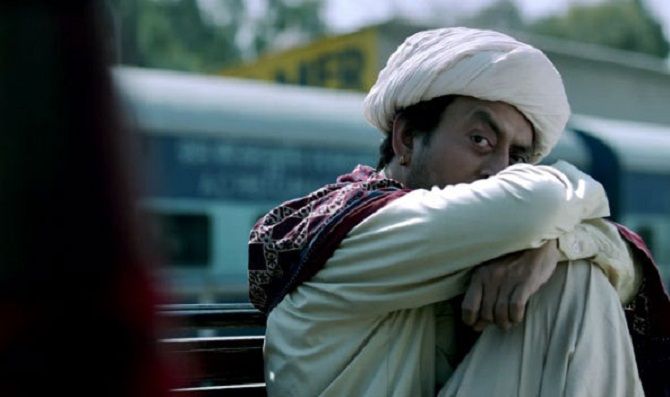
That was how the interview with Irrfan Khan began.
Did it augur well? I didn’t know, not yet. India’s most celebrated actor is certainly… like Irrfan, I find myself searching for words before I settle on ‘unusual’.
His eyes are slightly bloodshot and a patina of exhaustion coats his face, possibly caused by the additional pressure of his role as producer for Madaari, which releases this Friday.
The role of a father, who loses his family in a man-made tragedy, seems tailormade for the actor which could be why Irrfan picked up the phone and asked Nishikant Kamat to helm the film.
But there is more to it than just making another movie… Irrfan is not merely interested in creating a three-hour experience that you can forget once you step out of the darkened environs of the theatre.
Considering where you are today, what scares you the most?
Uhh… (long pause).
If I get stuck and I don’t evolve… If I stop reflecting about myself…. If I go into automatic mode… That’s scary…
Has that ever happened to you?
Yes, why not?
You were in automatic mode when you are born, when you were taught by society and parents.
They try to make you how they want to see you but then you discover that you are born to make your own choices. You understand yourself. Nobody can make you understand anything.
You have to find your own religion, you have to find your own values. You have to find yourself.
Is that somewhat like your character in Madaari?
There is only one thing that is similar in with my character in Madaari… he was in an automatic mode. Then something happens to him and he is forced to ask a few questions. And asking those questions leads him to making choices which were not expected from him.
In Madaari, you are working with a child actor. The boy looks like he is almost the age of your younger son. How easy or difficult is it for you to play such a character?
Kids and animals and water… these three elements are very difficult when it comes to shooting, so I was concerned. But the boy is so intelligent and so gifted that, in a day or two, he got the rhythm of the story. It was a pleasure working with him.
There are moments, at least that’s what it looks like from the trailer, when you have to be harsh with him?
Yes. I am supposed to be a threat to him. I need to put on an act where he is scared of me.
As a father, are you able to separate that as an actor or do you feel something inside?
As a father, yes, you separate (the two) because you are playing a character. You are not being yourself.
All this is happening through you, but it is the character’s attitude you are playing. It’s not a part of your personality. It’s not a part of your attitude.
In a recent interview, you talked about how Madaari evolved as you were shooting.
It’s just about the structure… we didn’t know how it was going to come together.
It was a challenge for me and for the director because the film does not have a regular, linear structure.
So we were always on our toes…
Do you enjoy working with this kind of uncertainty?
Oh yes (emphatically). Yes. The film challenges you because there is no safety net.
When you are not sure of what is going to happen and things fall into place, there is a sense of creation and you feel nice about it.
As an actor, how important is a bound script?
I’ve been asking for a bound script for many years now. I need to know.
But there are a few directors, like Shoojit Sircar, from whom I would say I don’t need a bound script. I don’t need to know because I trust them.
And it’s not just about a bound script. You want to know how the director is going to shape the film, who’s the producer, how they are going to position the film…
Shoojit Sircar turned you into a romantic hero…
Ya… there was one shot, a very smmaaaaallll interaction… just a look at the end of the journey (when they reach Kolkata). We are all tired. Deepika’s father has slept. The servant is sleeping. Deepika is sleeping. And I look at her.
Shoojit was taking the shot from another car. He got down, patted my back and said, ‘We have a new romantic hero.’ (laughs)
Are girls now looking at you in that romantic sense after Piku?
Ya… and I was desperate for that change to happen (laughs).
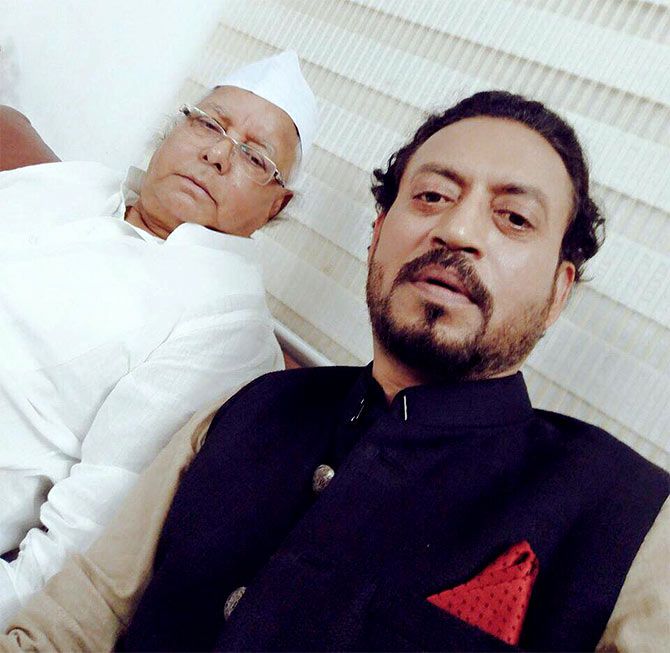
It’s almost like he is tasting each word, rolling them around and around, before he speaks.
It reminds you of a sculptor, or a painter, chipping away gently at a stone, or dabbing tiny blobs of paint together, to create the vision he wants to present to the world.
It’s like you are talking to two Irrfans instead of one… there’s the one you see on the surface and there the other, the hidden Irrfan very few get to see, whose mind is constantly churning, who – to use his favourite world – is constantly ‘evolving’.
But when he is ready, he does not hesitate to put forth his opinion, even if it might be considered unpalatable.
Your film’s tagline says, ‘Desh so raha hai.’ Is that how you feel about India today?
Yes. People have a tendency to go into slumber. We got independence so many years ago but politicians continue to manipulate us. They still play the card of caste and religion and we still fall into that trap.
We are still are not aware of our Constitution.
We still don’t ask for accountability.
Our system should constantly evolve. If people don’t take care of that, if people don’t push the machinery to be accountable, the system will start serving the people who are running the system.
They (the politicians) should be answerable to what promises they make, what they are doing, why they are asking for votes.
Are they concerned about us or are they concerned about their power?
Are they only concerned about retaining their seats?
We again fall into that same trap, again and again, again and again. So what is it? Are we sleeping or are we awake?
Why do you think that happens?
Because we, the whole system, the whole education system is about producing labour for corporates. Human beings are educated not to explore themselves; they are educated for earning their living.
But education should be for completely different reasons. It should be to explore oneself and the planet you are living in and the relationship between you and the planet.
One to should be able to identify the profession where one’s passion lies, not otherwise ke passion toh theek hai, jo hoga dekha jayega, paisa kahan se kamaoonga (Passion is all right, we’ll see what happens about it, but how how are you going to earn a living).
Your valued human being turns into… you don’t really explore the potential of a human being. You become a tool, a very small tool that fits into a particular slot.
In a recent interview to a television channel, Prime Minister Modi said ‘humour’ was ‘risky’ and ‘there was no sense of humour left in public life’.
You know, I’m pleased that he is concerned about it. I would like to see some effort too (in this direction) so that the situation becomes much better.
Do you feel we as a country have become overly sensitive about everything, whether it’s humour, whether it’s food, whether it’s religion?
See, it’s not the common people. They have got a platform to express themselves (referring to social media). Sometimes, the expression might become ugly because it has also become a means of taking out your frustration.
But there is a hired army which has a function… Dus pandhra hazaar rupaye dekhe (you have paid Rs 10-15,000)… you have hired thousands of people. If anyone criticises you, their job is to just start trolling. That is really ugly. That changes the atmosphere.
As a Muslim, do you feel uncomfortable or threatened in India?
No, I don’t feel like that. As a human being first, I want to say that you don’t choose your religion but human beings should be able to do so. A healthy atmosphere is one where a human being has the freedom to follow any religion he wants.
In today’s time -- I’m not just talking of one country but the whole world -- religion is become a tool to manipulate and mobilise people to create a gang; sometimes, they are hired gangs. Religious philosophy gets abducted by certain groups and becomes a a business.
It’s not just religious philosophy… slogans gets abducted. Sufi sayings get abducted. Freedom fighters get abducted. Spiritual leaders get abducted.
Everyone knows what’s happening in our country.
We live in a multi-dimensional country… there are positive things, there are negative things (that take place). What we lack is accountability and transparency in our system. When a person promises something, when a person takes a decision and if he goes away in two-three years, what is the accountability? That’s what I want to see. Who is accountable if something happens?
Are people, leaders -- I don’t want to call them leaders -- politicians who promise something accountable?
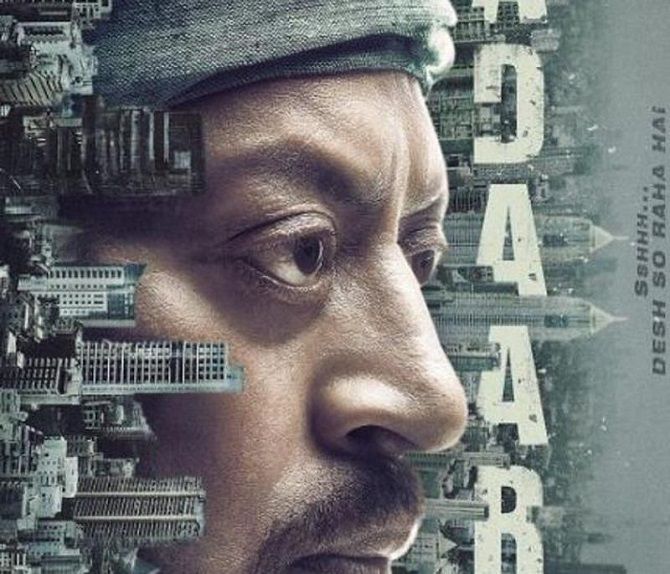
Irrfan -- he even dropped his surname at one point -- refuses to be slotted.
His parents -- Sahabzade Irrfan Ali Khan was born in Jaipur, Rajasthan to a zamindar family on January 7, 1967 -- were not wealthy but ensured their children did not lack for anything.
As is the wont of most parents, his parents too wanted a conventional, comfortable life for their children.
What they didn’t know then was that their second son was a bit of a rebel, with firm ideas of what he wanted from life and the gumption to follow his dreams.
Your parents wanted you to take up a traditional job.
My father’s way of educating me was to warn me to should learn a skill that would serve me well. It was not enough, he would often tell me, to just get the education and find a job.
Like most middle class people, my mother wanted fit me into a particular slot that was considered to be honourable… doctor, engineer, things like that.
But something in me revolted after a point. I tried my hand at a particular job and immediately understood how boring it was just to earn money.
What job did you do?
I trained in air conditioning. I put in a lot of hard work into it and did it with so much sincerity.
But you came from a wealthy family.
No, my father was a zamindar but he didn’t take anything from the government (after Partition). He didn’t want to, I don’t know why.
He was a self-made man.
So we were zamindars, but we were not rich. But my father was okay (financially). He gave us -- I have two younger brothers and an older sister -- education in a convent school.
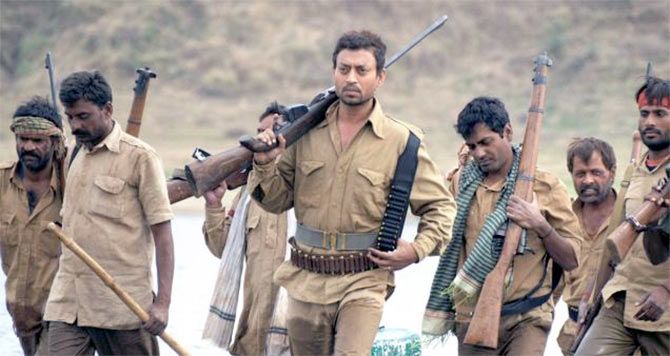
Awards.
Rewards.
The definitions have changed for Irrfan.
He has moved a long way from a dreamy-eyed boy in Delhi’s National School of Drama, who shivered, trembled and stumbled so badly over his very first acting opportunity that he lost the chance to knock on a door and tell the actor inside he was under arrest… and, of course, earn Rs 300 for doing so.
Today, he is a suave international celebrity, comfortable in his own skin.
Irrfan will take on the trappings of an actor, sitting patiently in carefully chosen threads to be made-up before he steps out for an event, his hair is curled into a tiny man bun.
But these, he is aware, are just devices to woo the outside world.
Inside, his mind continues to tick.
His talent is a craft he is constantly honing.
You won the Padma Shri in 2011 before you won the National Award for Paan Singh Tomar in 2012. What were those two experiences like for you?
The Padma Shri was an honour. I felt acknowledged and that acknowledgement really mattered because I don’t know any politician. I didn’t meet anybody (in order to get the Padma Shri).
I never imagined I would get it. I never even thought about it. And then, out of the blue, it happened. It made me feel good because I hadn’t even won a National Award…
The National Award is decided by a few people and is biased. In my case, I did a film which they could not… they didn’t have a choice.
Most of the times when I have won an award -- I am not talking about the Padma Shri but about filmi awards -- they didn’t have a choice. They had to include me.
You’re somebody the Hindi film industry does not completely understand so you are willing to step into their world.
I don’t have a grudge. I don’t have a complaint. My comments are not coming through complaints. It’s coming from understanding where they are and where my position is. The reality is that I still find myself an outsider and I am happy with it.
I don’t have a gang, I don’t have a group. Whatever I have achieved, I achieved through my work.
They don’t dislike my work; they appreciate it.
I don’t need to network to get acknowledged in an awards ceremony or things like that. I don’t complain about what they are doing. I have no problem. Whatever they are doing is their choice. What I am doing is my choice. And we are co-existing peacefully.
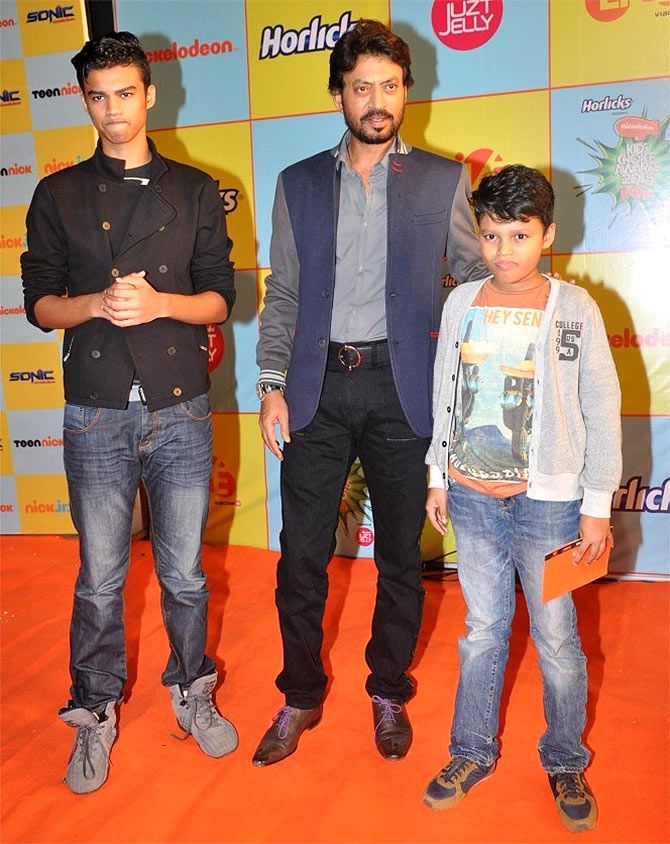
Irrfan’s a unconventional dad, willing to give his children the time they need to discover themselves.
He’s not sure the filmi duniya is for them but he takes his elder son, Babil, on the sets of his international film, Inferno, where the youngster chats up Tom Hanks.
The younger one, Ayan, has a channel on YouTube and recently participated in a publicity event for the trailer launch for Madaari.
Irrfan’s a conventional father. At the same event, even as Ayan was called up to answer a question, his dad was busy wiping the sweat off his son; the air conditioner, clearly, was not doing its job to daddy’s satisfaction.
He worries that his kids are too fascinated by the online world and don’t get enough physical activity; he’d like to see them play a bit more.
Do your kids think you’re cool?
I don’t know (sighs).
I think they should be in a space where they can really express what they feel about you.
It is a struggle to maintain an interactive space with kids because you also have to put restrictions. You also have to dissuade them from doing certain things. It’s a very tricky play of authority and friendship.
Whenever authority takes over, you have to check yourself and bring it to the level of friendship.
Children are very sensitive and they become very secretive if you exercise your authority too much. They stop revealing what’s going on with them.
Both your children seem interested in the film industry...
No, I don’t think so. I haven’t seen their interest as yet.
Your elder son’s Instagram says ‘You’ll see my movies when you grow up.’
Well…
And your younger son has a YouTube channel.
The internet is something where they get a lot of exposure and they want to be part of it.
I don’t think they have yet decided what they are going to do.
Are you worried about this exposure they are getting?
Sometimes. They spend so much time on it, you know.
My elder son is 16 and has the tendency to reflect -- he can get into something and come out of it -- but my younger son is just 12… very young and impressionable.
I want him to be active physically, you know. Sometimes what happens is that when you are on the internet you stop using the body. I keep on pushing him for physical activities.
At the screening of his film Two Comedians (a school project), Babil said something very interesting when he was asked about you. He said you know so much but still have the desire to learn… he hopes to have that ability too.
Oh… okay, okay, okay, okay.
It’s good.
I don’t tell them directly but maybe they have picked up the fact we have the immense possibility to destroy a life to evolve; to do the latter, we have to work towards it.
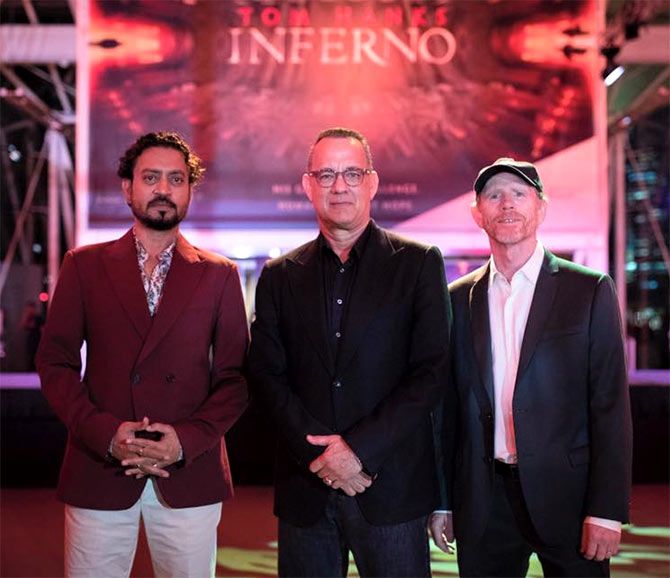
Experience.
Share.
Criticise.
Evolve.
Irrfan believes that, as a human being, he needs to constantly be in these four stages. To better himself, both as an actor and as a human being.
That is, until you mention Marlon Brando. And watch an actor melt into a fanboy :).
Read on…
What do you think is your best feature as a person and as an actor?
A tendency to criticise myself. I am not afraid of that.
So, then, you are the critics’ best friend.
(Laughs). Self-evolution only happens when you start seeing yourself with brutal honesty. You need to be able to rip yourself apart, see through yourself and stop justifying yourself.
Isn’t that a painful exercise?
That’s the only way to find freedom. Everything comes at a cost. Otherwise, you know, you can keep deluding yourself by justifying yourself.
Would you say you are free?
The whole process is to find freedom.
But are you free?
It is a lifelong exercise. Yes, I do feel free. I do take responsibility for my choices. That is the ability only given to human beings, where they can reflect on themselves.
What is it you dislike about yourself?
What do I dislike about myself (asks the question softly, then a long pause)?
Hmmm (long pause).
Hmmm (long pause).
What do I dislike about myself (asks the question softly)?
I don’t have a command over language (pause). I am not very expressive in forming my thoughts (pause). Uhh… I’m not a good speaker. Uhh… I have been lazy many a times.
I have been anxious many a times and I have lost the potential of that period. Like when I was in drama school… I was too anxious just to learn acting and not give enough importance to other aspects which I could have gained (pause).
Uhh… Uhh… I dislike my addictive nature… Like I am addicted to cigarettes. I don’t like that about myself.
Sometimes, I don’t respect my body and that is the only way to experience life. We are like portals for experiences. We are experiencing machines. We are just there to experience.
If we don’t respect our body, there is no other means to experience.
So when you see these flaws in other people, especially those people you care about, do they bother you?
Oh yes. Oh yes. If my kids pick up the same thing, it will definitely bother me. That’s how karma comes back to you.
If you can’t go beyond your challenge, that state will be repeated in your kids.
The Irrfan who started out believing he wanted to become an actor and the Irrfan who is sitting here today… what would these two Irrfans tell each other?
Aah… that was just a naive idea to become an actor, an innocent dream…
So that’s what this Irrfan would tell that Irrfan?
I would say ke that it was an innocent dream, but an ignorant dream holds a power. A lot of power. The only planning I did was that I would learn the craft in such a way that I won’t be ignored.
If I was intelligent enough, I would not have dreamt of becoming an actor. So I would say to that Irrfan, be like that.
And what would that Irrfan tell this Irrfan? Would he be happy?
Oh yes, oh yes. Because that Irrfan was only looking for acknowledgement and fame and money. Today, I am not just looking for that… I have more than that, I need more than that.
If my life promises enough money, enough fame, enough name and there is a full stop after that, I won’t consider my life a fruitful life. I won’t consider it an engaging life. I need to find more in it. For me, being an actor is like an opportunity to share my experiences with others; that is much more important to me.
If that opportunity is taken away from me, then this (everything he has) does not mean anything to me. That is the means to an end, that is just there to fill your insecurities, to make you secure. It does not fulfill.
There is a sense of fulfillment only when I share my experiences and give it to the audience and that experience becomes their experience and we have a kind of communication… connection.
What’s your connection with Tom Hanks like (Irrfan stars with him in the movie version of Dan Brown’s Inferno).
I haven’t seen a guy -- an actor particularly -- with so much warmth, so much genuineness, so much of curiosity, generosity and a sense of humour.
There are a lot of wonderful things about him.
And Marlon Brando (Irrfan is a self-confessed Brando fan)?
I wish I could have met him. I could give any part of my body to him if he wanted… I was so much in love with him. I still am. I will always be in love with him.










